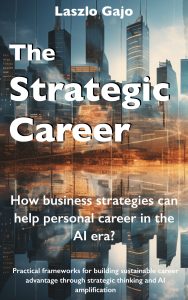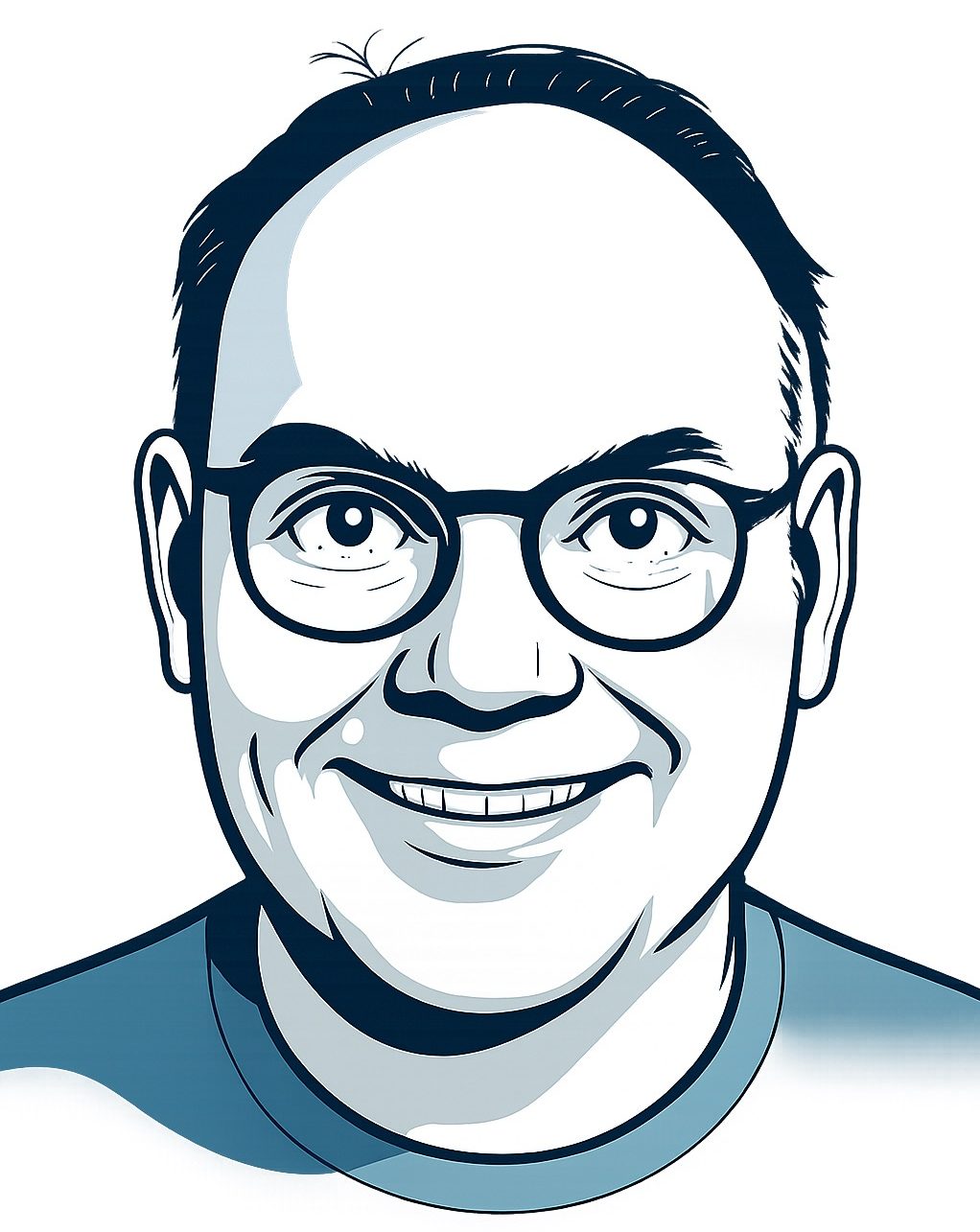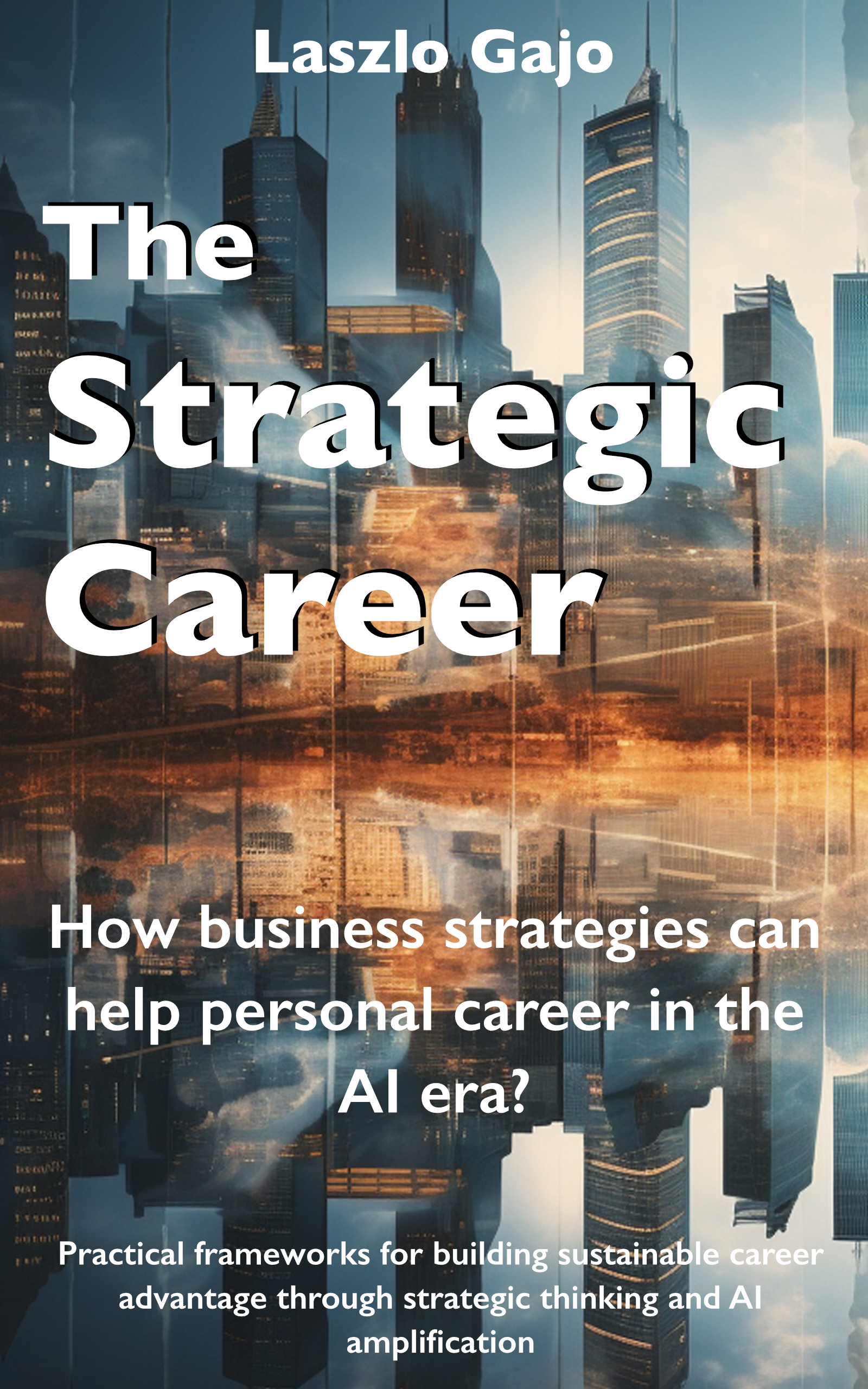A week ago, I published my new book: Strategic Career. The main drive was to showcase how proven business strategies can help an individual’s career, and I strongly believe it may be a life-changing experience. Nevertheless, there is more to it. I’m not a traditional career coach, and I didn’t set out to write a career book. I’m a business professional who ended up applying the same frameworks I use with companies to my own career journey, with results that actually worked.
Let me share that story, because it might offer some insights for your own professional path.
Starting Over in a New Country
In 2013, I made a life-changing decision to emigrate to Hungary. Like many immigrants, I quickly discovered that my previous experience didn’t translate directly to a new market. Despite having business experience, I found myself taking a job on an assembly line—not exactly where I’d envisioned my career heading.
But I had something that made the situation feel less overwhelming: I was simultaneously taking strategy and entrepreneurship courses at university. As I learned about how companies analyze their market position and plan their growth, a question kept nagging at me: Could these same principles work for individual careers?
It seemed worth trying. I had nothing to lose and potentially a lot to gain.
A Simple Experiment
During those evening hours after long shifts, I started treating my career situation like a business case study. I mapped out my current position, my capabilities, and my shortcomings. I analyzed the market around me, and tried to identify potential paths forward.
My Starting Reality Check:
- Strengths: will to learn, sales skills, and multilingual abilities
- Gaps: No local network, no formal degree, unfamiliar market, limited industry credentials.
- Opportunities: Growing international business in Hungary, demand for cross-cultural expertise
- Challenges: Starting from the bottom, need for local credibility
Instead of just hoping for the best, I sketched out what felt like an ambitious but achievable 10-year plan: move from assembly line work to a senior sales role in international business.
Most people probably would have called it unrealistic. But having a framework gave me something to work toward rather than just working away from where I was.
The Approach That Seemed to Work
Over the next decade, I tried to make each career move serve a specific purpose in this broader plan. I actively sought out challenging positions that would push my capabilities, even when it meant feeling overwhelmed. At university, I threw myself into my studies with the same intensity, graduating at the top of my class while working full-time.
I developed a pattern of moving to a new role roughly every few years—not because I was restless, but because that seemed to be the point where I’d absorbed most of what each position could teach me. Every transition was strategic, designed to add specific skills or experiences that my long-term plan required. I won’t lie—starting each new role was often humbling. I’d frequently feel in over my head, facing challenges I wasn’t sure I could handle. But I learned to see this discomfort as a positive sign that I was stretching myself appropriately.
Throughout this process, I tried to stay disciplined about focusing on capabilities the market actually valued rather than just skills I found personally interesting. I regularly researched industry trends and adjusted my learning priorities based on real market demand. It meant constantly stepping outside my comfort zone and accepting that I’d often be the least experienced person in the room, but each challenge built the foundation for the next opportunity.
Looking back, it worked better than I had hoped. But I should emphasize—it wasn’t easy. It required a lot of hard work, continuous learning, and some luck along the way. The strategic framework didn’t make the journey effortless; it just gave me a sense of direction and purpose.
Sharing What I Learned
As this career transformation unfolded, friends and colleagues began asking about my approach. How did I navigate such a significant change? What principles guided my decisions?
When I started sharing these ideas with others, I noticed something interesting. People who applied similar strategic thinking to their careers—even in small ways—seemed to feel more in control of their professional direction.
A marketing manager I knew used these frameworks to identify that her biggest constraint wasn’t skills, but relationships with senior leadership. Focusing on that insight helped accelerate her advancement.
A financial professional facing automation concerns used portfolio analysis to reposition himself from someone who competed with technology to someone who orchestrated it while providing strategic interpretation.
These weren’t miraculous transformations, but they were meaningful improvements that came from thinking more systematically about career development.
Why This Approach Feels More Relevant Now
When I started sketching the first draft of this book years ago, I wasn’t sure if these ideas would be useful beyond my own specific situation. But as I’ve watched the professional landscape evolve—with AI reshaping industries, remote work changing competition dynamics, and traditional career paths becoming less predictable—the strategic approach seems increasingly relevant.
We’re all navigating more uncertainty and change than previous generations of professionals. Having frameworks for thinking through these challenges, rather than just reacting to them, feels more valuable than ever.
What I’ve Tried to Put in the Book
The Strategic Career represents my attempt to organize and share the approaches that worked in my own experience and that I’ve seen help others. I took proven business strategies and applied them on a personal level. It’s not prescriptive—everyone’s situation is different—but it offers frameworks that might be useful for thinking through your own career challenges.
The book covers tools like:
- Mapping your professional situation systematically (what I call the Personal Career Canvas)
- Analyzing your capabilities like an investment portfolio and BCG
- Understanding the forces shaping your industry and career options
- Making strategic decisions about opportunities and trade-offs
- Leveraging AI tools to amplify your strategic thinking
These aren’t revolutionary concepts—they’re mostly established business frameworks applied to individual careers. But sometimes a different perspective can be helpful.

A Methodology, Not a Magic Formula
I want to be clear about something: this isn’t a magic formula that guarantees career success. There are no guarantees in professional life, and many factors beyond our control influence outcomes.
What I can say is that having a strategic framework helped me feel more intentional about my career decisions. Instead of just hoping things would work out, I had a methodology for analyzing situations and making choices that aligned with my longer-term objectives.
It didn’t eliminate uncertainty, but it gave me tools for navigating it more thoughtfully.
Your Journey Will Be Different
Your career situation, goals, and constraints are unique to you. The specific strategies that worked for my transition from assembly line worker to sales director might not be relevant to your path.
But the underlying approach—thinking strategically about your career, analyzing your position systematically, and making decisions that serve longer-term objectives—might offer some useful perspectives regardless of your specific circumstances.
Your career is probably one of your most important long-term investments. It seems worth approaching with the same kind of thoughtful planning you’d apply to other significant decisions in your life.
The frameworks are there if they’re helpful. The rest is up to you, and if you have read this article so far, as a thank-you gift, you get a 50% discount for any of my books at Smashwords, just use the BBPVC code until the end of August 2025.

